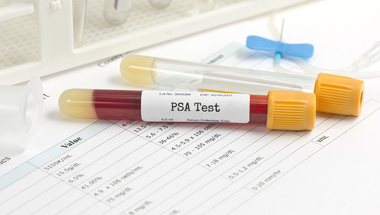Digital rectal examination (DRE)
A digital rectal examination (DRE) can be used to see if you might have a prostate problem. It involves your doctor or nurse feeling your prostate through the wall of the back passage (rectum).
The first test to see if there is anything wrong with your prostate is a PSA blood test. If this test is normal your doctor might then want to do a DRE, especially if you’re at high risk of prostate cancer. You don't have to have a DRE. You can choose to have a PSA test alone.
What does a DRE involve?
You might have a DRE at your GP surgery or at the hospital.
The doctor or nurse will ask you to lie on your side on an examination table, with your knees brought up towards your chest. They will slide a finger gently into your back passage. They’ll wear gloves and put some gel on their finger to make it more comfortable.
You may find the DRE slightly uncomfortable or embarrassing, but the test isn’t usually painful and it doesn’t take long. You can ask your GP if you would like to have someone there for support, for example, your partner, a friend or a chaperone.

Worried about having a DRE?
It’s natural to feel worried or embarrassed about having prostate tests, but some men find the idea of having a DRE upsetting. For example, if you’ve been sexually abused as a child or an adult, you might feel very upset about having this test. There’s no right or wrong way to feel about this, and it is your choice whether or not you have tests for prostate cancer.
It might be helpful to talk to a counsellor about your experience, thoughts and fears. Or you could contact a charity for people who’ve been sexually abused, such as the National Association for People Abused in Childhood (NAPAC) or SurvivorsUK.
You don’t have to have a DRE. You can make the decision to have a PSA test alone. If you do decide to have a DRE, explain your situation to your doctor as they can talk through the test with you and help to reassure you.
When I had the DRE I thought, ‘For a few seconds of discomfort, I can live with it’. Yeah it’s uncomfortable, but it could save your life.
What do the DRE results mean?
A digital rectal examination (DRE) is a test used to see if you might have a prostate problem or prostate cancer.
Your prostate may feel:
- normal – a normal size for your age with a smooth surface
- larger than expected for your age – this could be a sign of an enlarged prostate
- hard or lumpy – this could be a sign of prostate cancer.
The DRE is not a completely accurate test. Your doctor or nurse can’t feel the whole prostate. And a man with prostate cancer might have a prostate that feels normal.
What happens next?
Your GP will talk to you about all your test results and what they might mean. If they think you may have a prostate problem, they may be able to talk you through the possible treatment options with you. Or if your GP thinks you may need further tests, they may make an appointment for you to see a specialist at the hospital. If they think you could have prostate cancer, you will usually see the specialist within two weeks.
References and reviewers
Updated June 2025 | To be reviewed June 2026
- Jones D, Friend C, Dreher A, Allgar V, Macleod U. The diagnostic test accuracy of rectal examination for prostate cancer diagnosis in symptomatic patients: a systematic review. BMC Fam Pract. 2018 Jun 2;19:79.
- National Institute for Health and Care Excellence. Suspected cancer: recognition and referral. 2025; Available from: https://www.nice.org.uk/guidance/ng234
- Office for Health Improvement and Disparities. Advising men without symptoms of prostate disease who ask about the PSA test [Internet]. GOV.UK. 2024 [cited 2025 Apr 22]. Available from: https://www.gov.uk/government/publications/prostate-specific-antigen-testing-explanation-and-implementation/advising-well-men-about-the-psa-test-for-prostate-cancer-information-for-gps
- Office for Health Improvement and Disparities. PSA testing and prostate cancer: advice for men without symptoms of prostate disease [Internet]. GOV.UK. 2024 [cited 2025 Apr 22]. Available from: https://www.gov.uk/government/publications/prostate-specific-antigen-testing-description-in-brief/psa-testing-and-prostate-cancer-advice-for-men-without-symptoms-of-prostate-disease-aged-50-and-over
- Our Health Information team
- Our Specialist Nurses.



